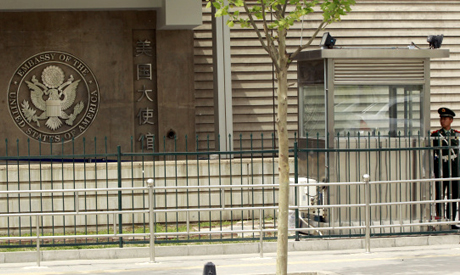
A Chinese paramilitary police officer stands guard at the entrance of the US Embassy in Beijing, China, Sunday, (Photo: AP).
An agreement, announced hours after US Secretary of State Hillary Clinton arrived in China for key annual talks, saw China give the world-renowned campaigner Chen Guangcheng assurances that he and his family could lead a normal life, US officials said.
Guangcheng, who riled the Chinese authorities by exposing forced abortions and sterilisations under the "one-child" policy, fled house arrest on 22 April and sought refuge in the US embassy, where he demanded assurances on his freedom.
In a video address to Premier Wen Jiabao released after his dramatic escape, the blind activist alleged he and his wife and young child had suffered repeated abuses at the hands of local officials in his hometown in northern China.
Clinton, who has in the past repeatedly criticised China's treatment of the 40-year-old legal campaigner, said the United States remained "committed" to his case.
"Mr. Chen has a number of understandings with the Chinese government about his future, including the opportunity to pursue higher education in a safe environment. Making these commitments a reality is the next crucial task," she said.
"The United States government and the American people are committed to remaining engaged with Mr. Chen and his family in the days, weeks and years ahead."
Clinton's statement marked the first substantive remarks made on record by a US official about Chen after complete silence since he dramatically escaped house arrest and fled to the US embassy.
US officials said that Chen never sought passage to the United States and instead wanted to live and work in China alongside his family.
Any renewed abuse against Chen could prove to be a political nightmare for President Barack Obama's administration, which has faced calls to show its commitment to safeguard human rights in China.
Chen's case had threatened to overshadow the annual meeting between leaders of the world's two largest economies on key issues ranging from North Korea's rocket launch to Syria.
The affair has drawn an angry reaction from Beijing, which on Wednesday demanded that the United States apologise for what it called "interference" in its affairs.
"China is very unhappy over this. The US action is an interference in China's internal affairs and China cannot accept it," Chinese foreign ministry spokesman Liu Weimin said.
"China demands that the US apologise and thoroughly investigate this incident, deal with the people who are responsible and ensure these types of incidents do not occur again," he said.
A US official said there would be no repeat of the incident, but declined to comment on China's call for an apology.
Chen's flight came despite round-the-clock surveillance around his home in eastern Shandong province, where he has alleged that he and his family suffered severe beatings after he ended a four-year jail term in 2010.
In the video released after his escape, he appealed to Wen to punish several local officials he said had made his family's life a misery.
Before the Chen case, Washington had hoped to showcase small signs of progress in relations with China at the Strategic and Economic Dialogue, which also includes US Treasury Secretary Timothy Geithner.
Largely in response to inflationary pressure, China has let its yuan appreciate. Currency levels have long been a source of friction, with US lawmakers charging that Beijing keeps the value of the yuan artificially low to flood the world with cheap exports.
On other sore points, China has in recent weeks reduced imports of oil from Iran, spoken out -- albeit cautiously -- against a rocket launch by North Korea, and supported a peace plan for Syria after joining Russia in vetoing two UN resolutions.
South Sudan said China, a major oil importer, would lend the new nation $8 billion despite Beijing's longstanding ties to Khartoum. The US pointman on Sudan, Princeton Lyman, is joining Clinton to seek China's help in ending recent fighting.
Short link: